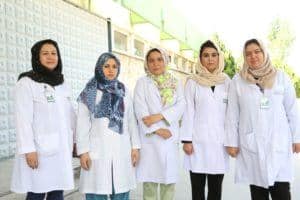Under Taliban rule in the 1990s, women in Afghanistan were barred from attending school. Because law and tradition also prevented them from receiving treatment from male doctors, most women gave birth at home, often without a skilled attendant.

We’ve helped fund Cure’s 18-month fellowship training program for female surgeons in obstetrics and gynecology, a program that enabled five graduates to receive advanced fistula training. Those five women are now on staff at Cure, increasing the hospital’s capacity to treat even more women. Cure reports that they are on track to provide more fistula surgeries in 2016 than they have in any of the previous 10 years, and we are delighted to be their main funder for these free surgeries. Since January 2015, your generosity has helped provide free fistula surgery to 165 women in Afghanistan.
This story originally appeared in the Fall 2016 edition of our newsletter, Transformations.